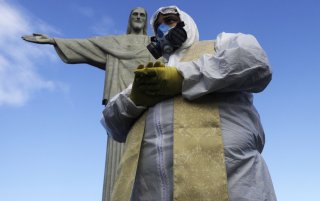5 Best Ways to Avoid Contracting or Spreading Coronavirus
Asymptomatic carriers have the potential to infect those over the age of sixty-five who are considered to be at the highest risk of dying from the virus.
There is a strong possibility that a viable coronavirus vaccine will be available this winter or early next year, but that doesn’t mean that you should let your guard down.
As evidenced by the more than 25.4 million confirmed cases of coronavirus worldwide—including at least 849,000 deaths—many health officials and doctors are in agreement that the coronavirus is a highly contagious and deadly disease.
To make matters worse, the World Health Organization recently sounded the alarm that the ongoing pandemic is now being largely driven by individuals between the ages of twenty and fifty who are unaware they are infected. These asymptomatic carriers have the potential to infect those over the age of sixty-five who are considered to be at the highest risk of dying from the virus, the agency added.
With this in mind, if you aim to keep yourself and your loved ones safe during this pandemic, here is a quick review of the five best ways to reduce the chance of contracting or spreading the coronavirus.
Wash Your Hands
Wash your hands often with soap and water for at least twenty seconds—especially after blowing your nose, coughing, or sneezing. If soap and water are not readily available, use a hand sanitizer that contains at least 60 percent alcohol. Make sure to avoid touching your eyes, nose, and mouth with unwashed hands.
Cover Coughs and Sneezes
Try to sneeze or cough into the crook of your elbow and not into your hands. Know that SARS-CoV-2 is found in high amounts in the nose and mouth, which means that it can be carried by air droplets to other people nearby when you cough, sneeze, or talk. Research is also showing that coronavirus can travel through tiny aerosol particles that can linger for up to three hours and cover greater distances.
Wear a Mask
The U.S. Centers for Disease Control and Prevention highly recommends that all people wear face masks or coverings when out in public. When used correctly, masks can help prevent individuals who are asymptomatic or undiagnosed from transmitting SARS-CoV-2 when they breathe, talk, sneeze, or cough. Be aware that not all masks are equally effective, as tests have shown that neck gaiters—tubes of performance fabric generally used for running and exercising outdoors—offered basically zero protection and even had the potential to spread the virus further.
Practice Social Distancing
The fewer people you’re around, the lower your chance of getting infected. It’s best to stay away from crowded places, but if you must be out in public, make sure to keep at least six feet of space between you and other people who are not from your household.
Clean and Disinfect
Know that you can also get infected if you touch something that has the virus on it and then touch your eyes, nose, or mouth. SARS-CoV-2 has been known to survive on plastic and stainless steel for up to seventy-two hours, so you should regularly wipe down surfaces that you and others touch often, such as countertops, door handles, and smartphones.
Ethen Kim Lieser is a Minneapolis-based Science and Tech Editor who has held posts at Google, The Korea Herald, Lincoln Journal Star, AsianWeek and Arirang TV. Follow or contact him on LinkedIn.
Image: Reuters

